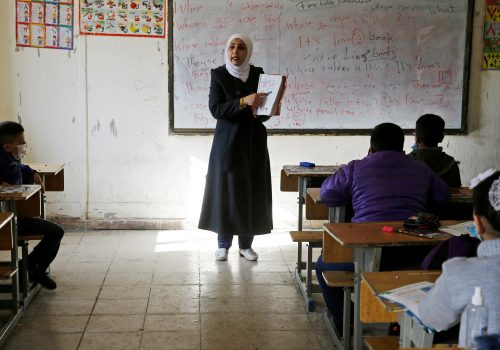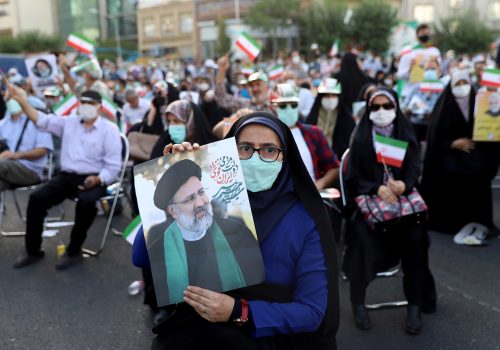Event Recap: A conversation with Iraqi Deputy Prime Minister and Finance Minister Ali Allawi
On July 28, the Atlantic Council’s Iraq Initiative hosted an event with His Excellency Ali Allawi, Iraq’s Deputy Prime Minister and Finance Minister, to discuss the Iraqi delegation visit to the United States, the White Paper for Economic Reforms, and Iraqi economic and political developments. Dr. Abbas Kadhim, director of the Iraq Initiative at the Atlantic Council, moderated the conversation.
Highlights of the Iraqi delegation visit to the US
- Allawi acknowledged that the delegation visit’s main focus was political and revolved around the future presence of US troops in Iraq.
- The response from Baghdad on the agreement between President Joe Biden and Prime Minister Mustafa al-Kadhimi that US combat troops will leave the country has been highly supported across the Iraqi political spectrum, Allawi said encouragingly.
- Allawi believes that there are great benefits in having US logistical and tactical support without combat involvement from American troops, as he believes it gives Iraq a better base of support in reducing terrorist activities in the country.
- On the economic front, Allawi elaborated on the extensive series of conversations he had with leading US economic institutions, particularly highlighting his meeting with US Treasury Secretary Janet Yellen, where they discussed the depth and extent of the US commitment to the Iraqi reform program.
- Allawi hopes that the US expands its engagement with the Iraqi economy beyond just oil, gas, and power sectors, citing consumer-goods production, construction, and housing sectors as examples of areas that the US could be more involved in.
- Expanding on climate change, Allawi discussed Iraq’s reaffirmation to maintaining Paris Climate standards.
- On both the economic and political front, Allawi believes that the Iraqi delegation’s visit to the US was “very successful.”
The White Paper for Economic Reforms
- From the onset, Allawi established that the white paper is not a short-term plan. Rather, it is a long-term initiative seeking to overcome a significant amount of issues in the Iraqi economy.
- The underlying thesis, Allawi claims, is that the current central government’s structure is inadequate to accommodate the needs of a modern economy.
- Allawi argues that extreme and radical change will be required to tackle the daunting task of overhauling an economy that he believes has been underperforming since the 1970s.
- Allawi believes the most critical change that needs to happen to reform the Iraqi economy is a massive shift away from oil dependency in the economy, describing the critical need for diversification. Allawi argued that Iraq must diversify the economy “meaningfully” by looking at the changing regional and global economic environment.
- When discussing the creation of the white paper, Allawi describes how it did not come from one individual person. Rather, it is a combination of studies spanning more than fifteen years and the inclusion of current issues that make up this comprehensive reform package.
- From a global perspective, Allawi stresses the importance of the international community supporting this effort, believing that this effort does not have much to do with a lack of resources or capital transfer, citing that Iraq is not under-resourced but has had its resources mismanaged.
- In regards to implementation, Allawi noted that the Iraqi government’s first decision was a difficult but necessary one: a significant adjustment to the exchange rate because of the belief that the Iraqi dinar was grossly overvalued.
- Allawi discussed the consequences of devaluation. However, he noted that a studied devaluation is much better than a chaotic one and, since there was a high risk of overdemand for the Iraqi dinar, resources would have been depleted.
Internal Iraqi economic and political developments
- Allawi claimed that “it is a mistake” to say the government has done nothing to mitigate the effects of devaluation, citing the commitment of 50 percent of the incremental increase from the changes in the exchange rate, increasing expenditures in social areas, maintaining drug prices, and doubling the social security net.
- Giving an update on internal gas projects, Allawi highlighted how the first phase of gas guarding had been completed with the Basra gas company, with 20 percent of the total gas produced by the associated fields now treated by the company. He noted that there are hopes of expanding this project by about 40 percent.
- When asked about the internal security situation and how militia groups will respond to the recent US-Iraq combat troop agreement, Allawi split these militias into three groups: those in the government, those with some organizational coherence, and “renegades”—with the first two groups either being accepting of the recent US military news or remaining neutral.
- In terms of Iraqi banking sector reforms, Allawi acknowledged that this critical issue has been left unattended. Therefore, major steps have been taken during July that aim to alter the internal rules and procedures of the banks and change their board of directors.
- As a new government looms over the current Kadhimi administration, Allawi believes that, to keep his white paper reforms intact, there needs to be greater support by the international community to reaffirm their commitment to this project.
Iraqi economic and political developments
- The impacts of the coronavirus pandemic on Iraqi imports caused shipping prices to go up by three or four times, claimed Allawi, citing this increase in global prices as one of the main issues the Iraqi government faces.
- Allawi described the ongoing economic integration project between Egypt, Jordan, and Iraq as one of Iraq’s most important initiatives, believing that the integration of all three economies through the removal of trade barriers and improved transportation benefits all parties.
- Expanding on the Egypt, Jordan, and Iraq integration project, Allawi described the potential for a combined market of over 150 million people, giving these three nations better opportunities and a competitive advantage in attracting foreign investors.
- Allawi believes that bilateral trade with India has been “quite robust.” He emphasized how India has been supplying Iraq during the pandemic with various critical pharmaceuticals—like the AstraZenca vaccine—and how India has a “significant share” of the public sector pharmaceutical imports to Iraq.
Hezha Barzani is a Young Global Professional with the Middle East Programs.


